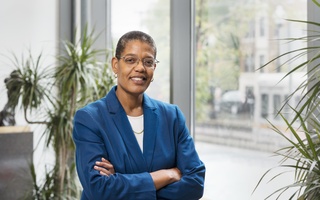Since then, the percentage of students receiving financial aid has increased from 40 percent to 60 percent, in part a product of more recent pushes to expand financial aid for middle-class families.
“Harvard is one of the few institutions where financial aid is growing faster than tuition,” said Jake W. C. Silberg ’15, who sits on the student-led Capital Campaign Task Force.
According to meeting minutes from a presentation given to the U. C. task force in March, Assistant Dean of FAS Development Services Beth B. Thompson said that, of the $182 million in financial aid allotted for the upcoming school year, approximately 60 percent came from scholarship gifts from donors and the remaining 40 percent came from internal unrestricted funds raised through other avenues, such as the capital campaign.
And although teaching and learning initiatives have maintained a lower profile than the other two “big buckets,” administrators have also said they want to prioritize promoting innovative pedogogical practices in Harvard classrooms with efforts like the Initiative on Learning and Teaching, announced in 2011. These initiatives may also impact the academic experiences of undergraduates.
With House Renewal plans surging forward, the financial aid program expanding, and teaching and learning efforts taking shape, several of the initiatives listed by administrators as priorities for the upcoming campaign will evidently benefit the College.
“Although it’s going to be a University-wide capital campaign, the College will definitely play a significant part,” Bicknell said.
A STUDENT VOICE
As University administrators and fundraisers continue to define goals and priorities for the campaign, students have sought to shape the way that incoming funds will be allocated at the College.
In October 2012, a year after the Undergraduate Council published a report calling for the creation of a campus-wide student center, Faust told The Crimson in an interview that this project would be “a priority” in the upcoming capital campaign.
Motivated partly by Faust’s endorsement of a student center, the UC launched the Capital Campaign Task Force the following month.
According to several committee members, the UC task force has focused primarily on financial aid and House Renewal—two potential “buckets” that administrators and fundraisers have also prioritized.
“Financial aid is my top priority,” said Silberg. “Harvard’s generous financial aid is what allows me to be here.”
Sam G. Greenberg ’14 said that administrators have similarly emphasized financial aid when communicating with the task force.
“It’s been portrayed to be a very big priority in the materials that we’ve received,” he said.
Both administrators and members of the task force placed a premium on House Renewal as well, committee members said.
Read more in College News
Administrators Seek Input from Harvard Community about Creating First Honor CodeRecommended Articles
-
Fundraising Push Could Be Delayed FurtherHarvard’s plans to launch a long-delayed capital campaign are once again in limbo, even though alumni donations have held largely
-
Capitalizing on CommunityRecent revelations that Harvard has quietly begun fundraising for a capital campaign have prompted speculation on the extent and direction ...
-
A Promising CampaignAs Harvard determines the priorities for the campaign, administrators should give students and faculty a stake in the planning, prioritizing, and fundraising.
-
Mixed SuccessOne of the primary functions of the largest fundraising effort in higher education history must be to make sure the opportunities Harvard affords are more broadly available than ever before.
-
 Harvard School of Public Health Dean Will Spend Capital Campaign Cash on Construction, Financial Aid
Harvard School of Public Health Dean Will Spend Capital Campaign Cash on Construction, Financial Aid













